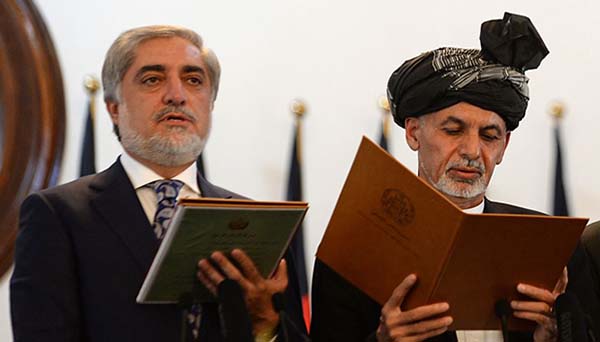Afghans were elated at National Unity Government (NUG)’s assumption of office after a prolonged controversy a year ago, hoping the new administration deliver on the many promises it had made to them. All that proved short-lived, however.
Through the subsequent months, as Afghans were waiting for things to become better, the NUG encumbered itself with power sharing arrangements to an extent that it barely could take care of, inter alia, the security situation which was exacerbating.
Soon, to everyone’s dismay, the many promises the two run-off runners had made proved hollow. According to Impassion Afghanistan’s SadRoz report (100 Days reports), the NUG could achieve only four of the 110 promises that were to be achieved in the first 100 days of the administration in office.
After the death of Mullah Omar’s death in late April, the NUG embarked on a publicity war against the Taliban claiming that the group’s weak leadership in the aftermath of Omar’s death will enfeeble them. Assuming the group’s leadership after bitter internal disputes, Mullah Akhtar Mohammad Mansur sought to prove the group is still strong enough to challenge Afghan government and security forces.
Sporadic onslaughts ensued, with a new tactic of hit-and-run. The group’s maneuvering was more strategic, however. In late September, the group raided Konduz, the first province that fell to the Taliban since 2001. It took almost two weeks for the government to reassume control of the city. Nevertheless, Taliban’s skirmishes never stopped. Many districts in North, particularly in Faryab province, swung between the Taliban and Afghan security forces.
More recently, Sangin, Helmand’s key district fell to the Taliban on December 21, a day after the deputy governor had warned the central government of losing the district. Taliban, of course, cannot stay for long in the district—at least for now. But such attacks, certainly, claims lives of many citizens and Afghan security forces along with undermining government’s legitimacy. Is such a setting, NUG’s though categorical stance against the Taliban seem less plausible to Afghans. Therefore, NUG dramatically loses public support and approval.
Asia Foundation’s report, published on November 17, shows that Afghan’s optimism about whether the country is going in the right direction has dramatically fallen, with 57.5 percent saying it is not. Taliban’s attacks and the NUG’s failure in preventing them, is a major factor in this loss of confidence of people in NUG’s performance.
Yet that is not the only challenge in regard to security. Daesh, also known as ISIL or IS, is another, and even more challenging threat. Afghan government confirmed Daesh’s presence in the country in mid-March. Since then, the group has secured footholds in the country, posing serious security threat to both the government forces and to the citizens. The group beheaded 7 bus passengers taken hostage on November 8 callously.
The brutality shocked Afghans citizens who went out on the street in Kabul three days after the beheading, calling on the government to resign and marked a strong protest unprecedented in the country’s history.
Now, Daesh has a radio station named Radio Voice of Daesh operating in Nangarhar, the group’s headquarter in Afghanistan. In nine months since their presence was confirmed, the group has grown strong enough to lead onslaughts on districts close to its headquarter in Nangarhar.
That being said, NUG’s measures to meet these threats are disappointing. Since its formation NUG has played the negotiation card in a very awkward manner, giving the Taliban the opportunity to sway between ‘peace talks’ at some times and fighting at others.
Furthermore, Taliban are not under a united command, so ‘peace talks’ will not meet the government’s expectation of peace and security. Yet, Taliban are not the only ones who fight the government.
With NUG losing in three fronts—the Taliban, the Daesh and the public confidence—it would be so wrong for the government to lay all its eggs in the basket of ‘peace talks’ and so unrealistic to expect such talks will provide desired goal. NUG should take serious measures to remedy its loss in each of the three aforementioned fronts. As so, It should rethink its playing of ‘peace talks’ card, and think of drastic measures in fighting Daesh, and try to regain people support.

